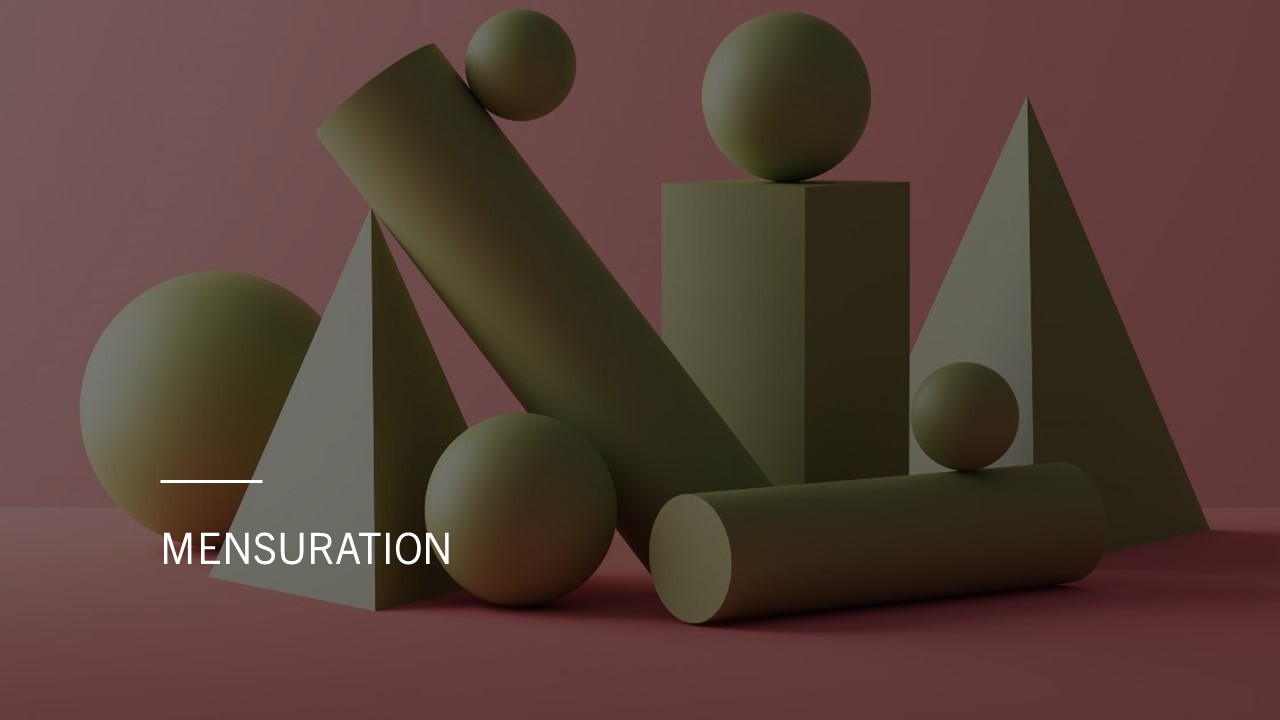STD IX – MENSURATION – (Online)

About Course
AREA AND PERIMETER OF PLANE FIGURES
The main components of a triangle’s area are the base and height of the triangle. The base of a triangle can be any side. The height of a triangle is the length of the triangle’s altitude the opposite side of the triangle.
We can also calculate the area of a triangle without knowing its base and height and given only 3 sides. Hero or Heron, a Greek Engineer and Mathematician in 10 – 70 AD devised a formula to find the area of a triangle by requiring no arbitrary choice of side as base or vertex as origin, contrary to other formulas for the area of a triangle, such as half the base times the height or half the norm of a cross product of two sides.
Area and perimeter of a triangle
Perimeter of a triangle = Sum of all sides of the triangle
Area of a triangle = 1/2×base×height
Area of Quadrilaterals
A quadrilateral is a figure made up of four straight sides. The most familiar examples of quadrilaterals are squares and rectangles. In the world around us; we might have come cross various situations where we need to find out the area and perimeter of objects which are quadrilaterals. Ex: Rooms, playgrounds, parks etc. The perimeter is used to measure the boundaries and the area is used to measure the regions enclosed.
Area of Circles:
Look at the shapes objects all around us. An object with a circular face such as a dinning plate, a clock, a disc or a circular flower bed in a garden are all built or prepared keeping the concept of area of a circle in mind. Also a slice of pizza looks like a sector. Let’s look at the formula to compute the area of the circle and sector.
Definition of a circle
Circle is the locus of a point moving in a plane such that its distance from a given point in the plane is always constant
A line segment whose end points lie on the circle is known as a chord of the circle
The diameter of the circle is the longest chord of the circle
The diameter passes through the centre of the circle Its length is twice the radius
SOLIDS
In Geometry, the shape or the figure that has three (even higher) dimensions, are known as solids or three-dimensional shapes. The study of the properties, volume and surface area of three-dimensional shapes is called Solid Geometry. Let us go ahead and focus more on the study of geometrical solids.
Geometric Shapes
The geometrical figures classified based on the dimensions are as follows:
Zero dimensional shape – A point.
One dimensional shape – A line that has a length as its dimension.
Two-dimensional shapes – A figure that has length and breadth as two dimensions. For example – square, triangle, rectangle, parallelogram, trapezoid, rhombus, quadrilateral, polygon, circle etc.
Three-dimensional shapes – An object with length, breadth and height as three dimensions. For example – cube, cuboid, cone, cylinder, sphere, pyramid, prism etc.
Higher-dimensional shapes – There are few shapes expressed in dimensions higher than 3, but we usually do not study them in middle-level mathematics.
Course Content
AREA AND PERIMETER OF PLANE FIGURES
-
00:57
-
00:00
-
06:00
-
04:00
-
24:35
-
02:04
-
00:57
-
02:32
-
02:08
-
AREA AND PERIMTER – CORE CONCEPT – AREA AND PERIMETER OF SQUARE AND RHOMBUS
00:00 -
AREA AND PERIMETER OF PLANE FIGURES – CORE CONCEPT – PROBLEMS BASED ON SQUARE, RECTANGLE AND DIAGONALS
00:00 -
00:00
-
00:00
-
AREA AND PERIMETER OF PLANE FIGURES – PROBLEMS BASED ON PARALLELOGRAM AND RHOMBUS
00:00 -
05:00
-
QUIZ – Mensuration – III LET’S RECALL
-
01:26
-
01:31
-
QUIZ – MENSURATION – AREA OF PARALLELOGRAM, RECTANGLE AND TRAPEZIUM
SOLIDS
Student Ratings & Reviews

No Review Yet

